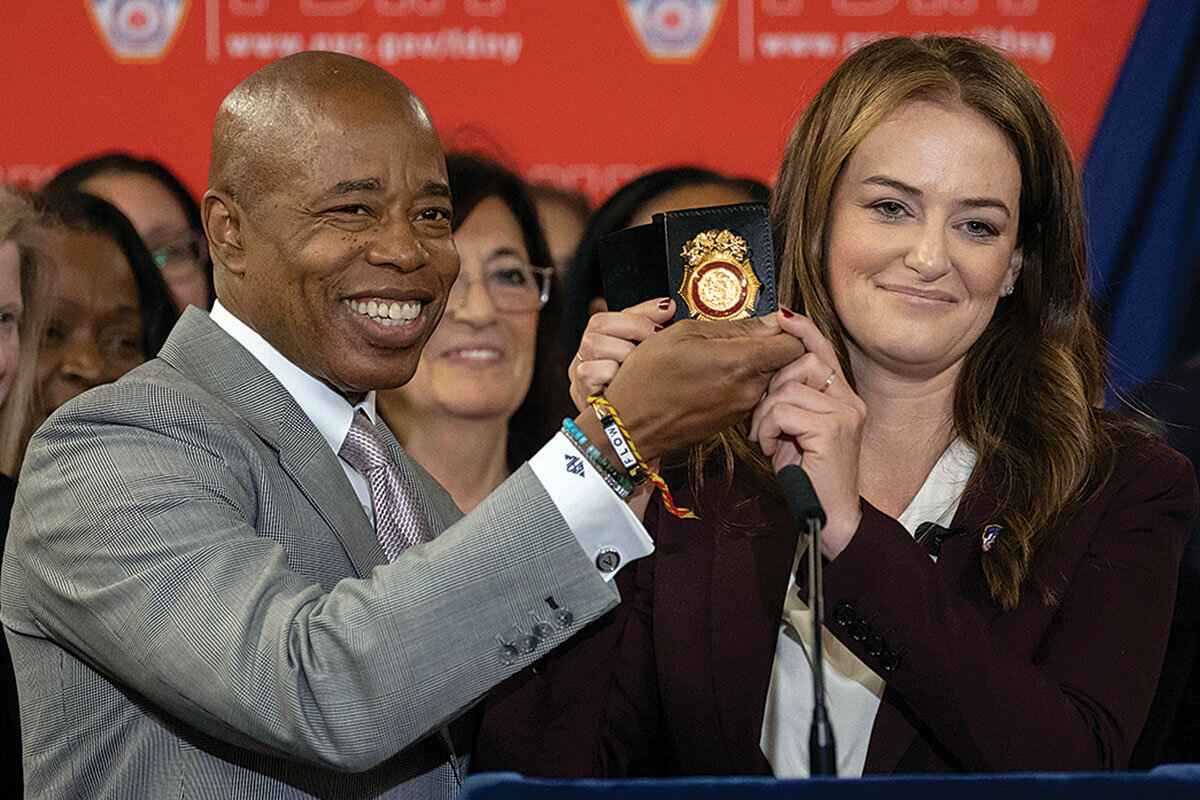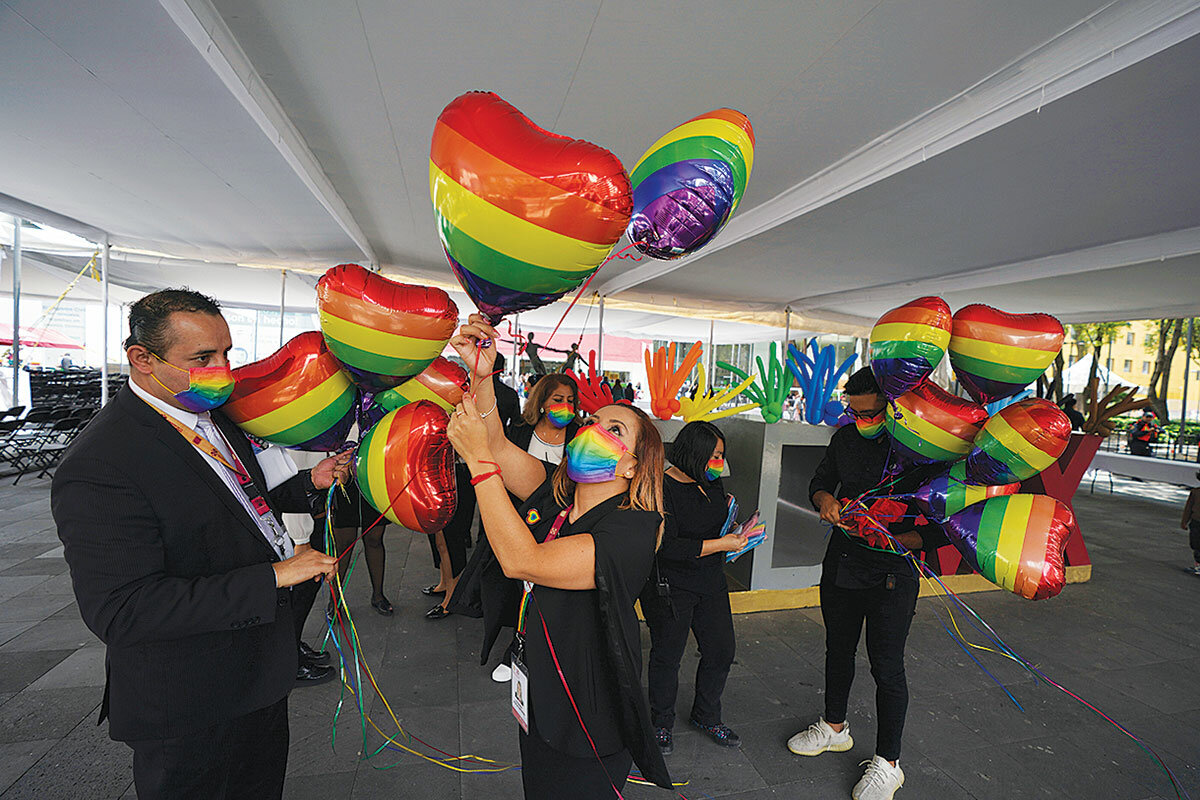From zero waste to LGBTQ rights: How cooperation got the job done
Loading...
1. United States
New York City’s Fire Department is being led by a woman for the first time in its 157-year history. Laura Kavanagh was promoted to the top position of commissioner by Mayor Eric Adams after an eight-month stint as acting chief. Ms. Kavanagh now oversees some 17,000 employees, including emergency medical workers and 911 dispatchers – as well as 141 female firefighters, the most in the department’s history.
“The people of the FDNY have provided me with an enduring faith in something I was raised with and have long known to be true, where you build a community, you create a force multiplier that does extraordinary things,” Ms. Kavanagh said.
Why We Wrote This
A story focused onThese are not achievements to be accomplished alone. But sort your garbage into 45 categories as Kamikatsu, Japan, does, and you too may be close to achieving zero waste in your town. And in Mexico lawmakers cemented same-sex marriage rights for the country.
Like other fire commissioners, Ms. Kavanagh has come from outside the ranks: She previously worked for former New York Mayor Bill de Blasio, and earned the praise of various union leaders in her time as acting commissioner. Mayor Adams has appointed several women to top administration posts, including the first female police commissioner, the sanitation commissioner, and the deputy mayor.
Sources: The New York Times, ABC 7
2. Mexico
Same-sex marriage is legal across all of Mexico. Following state-by-state legalization in progress since 2009, Tamaulipas, on Mexico’s northeastern border with the United States, became the last state where lawmakers voted to recognize same-sex marriage, cementing LGBTQ rights across the country.
“Today, we and our families are more visible, more equal, and we are a country with more justice,” activist Enrique Torre Molina said.
The Mexican Supreme Court had blocked state laws preventing same-sex marriage in 2015. It took some states years to design and vote on laws to conform with the ruling; one-quarter of the country got the job done in September and October. Latin American rights campaigners have seen recent wins, with Cuba legalizing same-sex marriage in September, though it remains illegal in most of Central America and much of the Caribbean.
Sources: Mexico News Daily, Al Jazeera, The Associated Press
3. United Kingdom
Three female European bison were introduced to West Blean and Thornden Woods in Kent in July, as part of a larger project to restore the area’s natural biodiversity. But no one knew that one of them was pregnant. “I wanted to scream it from the rooftops” after spotting the calf, said Tom Gibbs, a bison ranger at Kent Wildlife Trust.
Considered to be a keystone species and ecosystem engineers, bison are being brought back across the Continent. They’re even known to knock down trees in ways that reduce the chance for flooding. In the time since the species became extinct in the wild in the 1920s, it has been reintroduced in Poland, Belarus, Russia, Ukraine, Lithuania, Romania, and Slovakia.
Sources: CNN, The Washington Post
4. Gaza
Gazans are returning to their beaches after a massive cleanup. Every day for a decade, millions of gallons of untreated wastewater had been dumped into the Mediterranean Sea from the Gaza Strip. But after the electricity supply improved and repairs were made to sewage treatment infrastructure, beachgoers can once again enter the waters safely. With 2.3 million people in just 141 square miles, beaches provide one of the few public spaces for people to gather and relax.
In a region where the water treatment system has been in serious disrepair and potable water scarce, a blockade by Egypt and Israel makes it difficult to obtain materials like cement and pipes that are necessary for maintenance and repairs. But a group of Israeli, Palestinian, and Jordanian environmentalists convinced the Israeli government that the current situation was “lose-lose,” said Gidon Bromberg of EcoPeace Middle East. “You can never disengage from a shared environment. ... Tackling the climate crisis and water security, those are things that bring benefits to both sides. It’s about creating a healthy co-independence.”
Much of Gaza’s wastewater is now being treated, which is aiding wildlife in the Gaza Valley, some of the Palestinian territories’ largest but most polluted wetlands. A $66 million United Nations Development Program project aims to turn the damaged nature reserve into a proper outdoor recreational space.
Sources: The Guardian, Agence France-Presse, Positive News
5. Japan
The town of Kamikatsu, Japan, has figured out how to reuse or recycle 80% of its waste. When pollution from trash burning and dumping became an overwhelming concern, the community of 1,500 people declared in 2003 that it would be a zero-waste municipality. By 2008, it was recycling 58.6% of its waste, far higher than Japan’s average of 20%.
The town turned an incinerator into a recycling center where residents sort items into 45 classifications. Plastics must be cleaned and glass isolated by color. As a result of its efforts, Kamikatsu has reduced spending on incineration by 33% and makes about $21,000 each year from selling recycled paper, metals, and other materials. Local businesses such as Hotel Why extend sustainability practices by grinding only as much coffee as guests request and having them cut their desired amount of soap from a larger bar at check-in.
Consumption habits are changing too: Attached to the recycling center is a swap shop for unwanted items that can be reused by someone else – for free. Local shop owner Takuya Takeichi noted the change in thinking and behavior required to make the town’s program successful. It “nurtured a sense of caring for things,” he said. “We may have more of a burden, but I think we all gained richness in our minds.”
Sources: The Washington Post, Great Big Story, Reasons to be Cheerful











